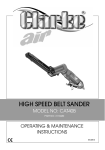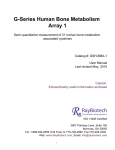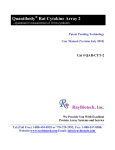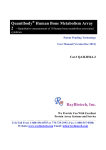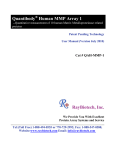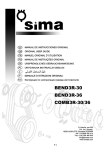Download Clarke CPR2 Specifications
Transcript
OIL FREE RIVETER MODEL NO: CPR2 PART NO: 3110285 OPERATING & MAINTENANCE INSTRUCTIONS GC0814 INTRODUCTION Thank you for purchasing this CLARKE Riveter. Before attempting to use this product, please read this manual thoroughly and follow the instructions carefully. In doing so you will ensure the safety of yourself and that of others around you, and you can look forward to your purchase giving you long and satisfactory service. SPECIFICATION Model Numbers CPR2 Rivet Sizes 2.4 to 4.8 mm Min. Hose Size (ID) 8 mm (5/16”) Operating Pressure 90 psi (6.2 bar) Air Consumption 0.03 cu.ft/stroke Air Inlet Size 1/4“BSP Female Sound Pressure Level (LpA dB) 77.3 dB(A) Sound Power Level (LwA dB) 88.3 dB(A) Vibration Levels 2.5 m/s2 Weight 1.4 kg Please note that the details and specifications contained herein are correct at the time of going to print. However CLARKE International reserve the right to change specifications at any time without prior notice. GUARANTEE This product is guaranteed against faulty manufacture for a period of 12 months from the date of purchase. Please keep your receipt which will be required as proof of purchase. This guarantee is invalid if the product is found to have been abused or tampered with in any way, or not used for the purpose for which it was intended. Faulty goods should be returned to their place of purchase, no product can be returned to us without prior permission. This guarantee does not effect your statutory rights. 2 Parts & Service: 020 8988 7400 / E-mail: [email protected] or [email protected] GENERAL SAFETY RULES CAUTION: FAILURE TO FOLLOW THESE PRECAUTIONS COULD RESULT IN PERSONAL INJURY, AND/OR DAMAGE TO PROPERTY. WORK ENVIRONMENT 1. Keep the work area clean and tidy. 2. Dress appropriately - Do not wear loose clothing or jewellery. Tie long hair out of the way. 3. Keep children and visitors away - Do not let children handle the tool. 4. Do not operate the tool where there are flammable liquids or gases. USE OF POWER TOOLS 1. Stay alert and use common sense - do not operate the tool when you are tired or under the influence of alcohol, drugs or medication. 2. Always wear eye protectors when using the tool - Eye protectors must provide protection from flying particles from the front and the side. 3. Always wear ear protectors when using the tool 4. Do not overreach - Keep proper footing and balance at all times. 5. Never use any type of bottled gas as a source of power for the tool. 6. Do not connect the air supply hose with your finger on the trigger of the tool. 7. Do not exceed the maximum pressure of 90 psi / 6.2 bar. 8. Check hoses for leaks or worn condition before use, and ensure that all connections are secure. 9. Keep the air supply hose away from heat, oil and sharp edges. 10. Do not use the tool for any other purpose than that described in this manual. 11. Do not fit the tool to any stand or clamping device that may damage it. 12. Do not carry out any alterations or modifications to the tool. 13. Always disconnect from the air supply when: • Performing any maintenance • The drill is not in use. 3 Parts & Service: 020 8988 7400 / E-mail: [email protected] or [email protected] • The tool will be left unattended. • Moving to another work area. • Passing the drill to another person. 14. Never use the tool if it is defective or operating abnormally. 15. The drill should be serviced at regular intervals by qualified service personnel. 16. Avoid damaging the tool, for example by applying excessive force of any kind. 17. ALWAYS maintain the tool with care. Keep it clean for the best and safest performance. 18. Quick change couplings should not be located at the tool. They add weight and could fail due to vibration. 19. Do not force or misuse the tool. It will do a better and safer job at the rate for which it was designed. 20. Do not remove any labels. Damaged labels should be replaced. 21. This tool vibrates with use. Vibration may be harmful to your hands or arms. Stop using the tool if discomfort, a tingling feeling or pain occurs. Seek medical advice before resuming use. TRANSPORTATION 1. Never carry the drill by the air supply hose. 2. Never carry the drill with your finger on the trigger. STORAGE 1. When not in use the drill must be disconnected from the air supply and stored in a dry place out of the reach of children (preferably in a locked cabinet). 2. Avoid storing the drill in environments where the temperature is below 0oC. 4 Parts & Service: 020 8988 7400 / E-mail: [email protected] or [email protected] THE COMPRESSED AIR SUPPLY AIR SUPPLY REQUIREMENTS WARNING: COMPRESSED AIR CAN BE DANGEROUS. ENSURE THAT YOU ARE FAMILIAR WITH ALL PRECAUTIONS RELATING TO THE USE OF COMPRESSORS AND COMPRESSED AIR SUPPLY. • Use only clean, dry, regulated compressed air as a power source. • Air compressors used with the impact wrench must comply with the appropriate European Community Safety Directives. • A build-up of moisture or oil in the air compressor will accelerate wear and corrosion in the impact wrench. ensure any moisture is drained from the compressor daily and the inlet filter is kept clean. • If an unusually long air hose is required, (over 8 metres), the line pressure or the hose inside diameter may need to be increased. • The air hose must be rated at least 150% of the maximum operating pressure of the tool. • A typical air line layout is shown above. If an automatic in-line filter/ regulator is used, it will keep the tool in good condition, but should be regularly checked and topped up with oil. SAE 10 oil should be used, and the lubricator adjusted to approx 2 drops per minute. • The minimum hose diameter should be 5/16”(8mm) ID and fittings should have the same internal dimensions. 5 Parts & Service: 020 8988 7400 / E-mail: [email protected] or [email protected] • Never exceed the maximum operating pressure for the tool. It is recommended that air pressure to this tool does not exceed 90 psi at the tool when running. Higher pressures and unclean air will shorten the life of the tool due to faster wear and is a possible safety hazard. BEFORE USE WARNING: COMPRESSED AIR CAN BE DANGEROUS. ENSURE THAT YOU ARE FAMILIAR WITH ALL PRECAUTIONS RELATING TO THE USE OF AIR COMPRESSORS AND COMPRESSED AIR SUPPLY. NOTE: Ensure the air supply is turned off. 1. If required, connect an in-line mini oiler to the tool. • A mini oiler helps to prolong the life of the air tool. Remove the oil fill screw from the side of the mini oiler and fill with Air-line Oil available from your CLARKE dealer. Replace the screw before using the tool. 2. If a mini-oiler is not being used, run a few drops of oil through the tool before use. It can be entered through the air inlet. 3. Connect a suitable hose to the female air inlet 4. Connect the other end of the hose to the air supply. 5. Turn on the air supply and check for air leaks. • Rectify any found before proceeding. Your air tool is now ready for use. You can fit a whip hose with a quick fit coupling if required (available from your Clarke dealer.). OPERATION Before starting work drain any water from the air tank and blow condensation from the air line. Drain compressor more frequently in hot humid weather. Note: item Nos refer to parts list, Page 10. Ensure the correct nosepiece (item 1x) is installed for the size of the rivet mandril being used, insert the mandril until the rivet buts snugly against the nosepiece. 6 Parts & Service: 020 8988 7400 / E-mail: [email protected] or [email protected] Insert the rivet into the workpiece to be secured, pressing firmly depress the trigger. The riveter will ‘fire’, breaking off the mandril, allowing the riveter to be removed from the workpiece and re-loaded. Spent mandrills will be ejected from the rear of the riveter. To change the nosepiece, unscrew and remove the installed nosepiece, a slight spring resistance will be felt. Choose the nosepiece to be installed, push firmly against spring resistance into the head (item 2), screw home and tighten with the wrench supplied. DISCONNECTING THE AIR SUPPLY Do not disconnect the air supply hose until the air supply has been shut down and the compressed air released. 1. Refer to the compressor instruction manual for the procedure to shut down and release the compressed air. 2. Once the pressure has been released, disconnect the air supply hose from the air tool. Store the tool safely in its box in a dry, secure environment. MAINTENANCE WARNING: MAKE SURE THAT THE TOOL IS DISCONNECTED FROM THE AIR SUPPLY BEFORE STARTING ANY CLEANING, OR MAINTENANCE PROCEDURES. DAILY 1. Before use, drain water from the compressed air supply. 2. Pour a few drops of CLARKE airline oil, into the air inlet. This should be carried out regardless of whether or not an in-line mini oiler is used. If an inline mini oiler is not used, this procedure should be repeated after every two to three hours of use. CLEANING 1. Keep the body of the tool clean and free from debris. Grit or gum deposits in the tool may reduce efficiency. If the riveting action becomes erratic or the riveter operates but fails to form a rivet successfully, it is possible that the jaw housing assembly (items 3 - 8)has worked itself loose, and requires adjusting. Should this occur, proceed as follows: 7 Parts & Service: 020 8988 7400 / E-mail: [email protected] or [email protected] 1. Unscrew and remove the head assy (item 2). 2. Using the wrench supplied, hold the jaw housing coupler (item 7), undo the locknut (item 8). 3. Place the 56mm gauge (on the edge of the wrench provided), alongside the jaw housing assembly (item 35 inset), and screw the jaw assy in or out, so that the lip of the gauge is in line with the end face of the jaw housing (item 3.) Secure in position with the locknut (item 8). Additionally, following prolonged use, the jaws may fail to grip the mandril effectively, and will therefore need replacing. Dis-assemble the jaw housing assembly, and re-assemble using genuine parts supplied from your nearest CLARKE dealer, ensure you carry out the adjustment above. SERVICE AND REPAIR If the tool runs erratically or becomes inefficient although the air supply is in good order, it may be necessary to dismantle the tool. Such servicing and repair work should be carried out by qualified service technicians. PERFORMANCE Please note that factors other than the tool may effect its operation and efficiency such as reduced compressor output, excessive drain on the airline moisture or restrictions in the air-line, or the use of connectors of improper size or poor condition which will reduce air supply. Grit or gum deposits inside the tool may also reduce its efficiency. This condition can be corrected by cleaning out the air strainer and flushing out the tool with gum solvent or oil, or failing this, the motor may require dismantling. **Clarke Air Line Oil (part no. 3050825) is available from your CLARKE dealer. STORAGE If the tool is to be stored, or is idle for longer than 24 hours, run a few drops of Clarke air line oil into the air inlet, and run the tool for 5 seconds in order to lubricate the internal parts. When not in use, disconnect from air supply, clean tool and store in a safe, dry place. ACCESSORIES A wide range of accessories is available including filter/regulators, lubricators, high-pressure hoses (5 to 50 metres) etc. Contact your CLARKE dealer for further information or CLARKE International Service Department on 01992 565333. 8 Parts & Service: 020 8988 7400 / E-mail: [email protected] or [email protected] TROUBLESHOOTING SYMPTOM PROBLEM SOLUTION Tool runs at normal speed but slows down under any load. 1. Excessive pressure on 1. Reduce the force tip. applied 2. Motor parts worn. 2. Return to Clarke dealer for repair. 3. Worn or sticking 3. Drip air tool lubricating mechanism due to oil into air inlet. Allow oil lack of lubricant. to soak moving parts before using. Tool runs slowly. Air flows weakly from exhaust. 1. Motor parts jammed with gum/dirt. 2. Regulator in closed position. 3. General airflow blocked by dirt. 1. Examine inlet air filter for cleanliness. 2. Adjust regulator to open position. 3. Operate tool in short bursts. Tool will not run. Air flows freely from exhaust. 1. Motor vanes stuck due to buildup of foreign material. 1. Disconnect air supply and rotate tool assembly manually. 2. Try operating tool in short bursts. 3. Tap motor housing gently with a rubber mallet. 4. Drip a few drops of air tool lubricating oil into air inlet to soak moving parts. 9 Parts & Service: 020 8988 7400 / E-mail: [email protected] or [email protected] PARTS DIAGRAM 10 Parts & Service: 020 8988 7400 / E-mail: [email protected] or [email protected] PARTS LIST No Description No Description 1A Nosepiece (3/16”) 20 O- Ring Seal (4) 1B Nosepiece (5/32”) 21 Valve Bushing 1C Nosepiece (1/8”) 22 Valve Screw 1D Nosepiece (3/32”) 23 Bottom cap 2 Head 24 Pin 3 Jaw Housing 25 Silencer 4 Jaw (2) 26 Snap Ring 5 Jaw Pusher 27 O-Ring 6 Spring 28 Damping Ring 7 Jaw HSG Coupler 29 Damping Ring 8 Nut 30 Bush 9 O-Ring Seal 31 Rear Piston 10 Housing 32 O-Ring Seal 11 Nut (2) 33 O-Ring 12 Front Piston 34 Housing Cap (alum) 13 O-Ring Seal 35 O-Ring 14 Piston Rod 36 n/a 15 X-Ring Seal 37 n/a 16 O-Ring 38 Screw 17 Cylinder Cap 39 Wrench 18 O-Ring Seal (3) 19 Valve Stem 11 Parts & Service: 020 8988 7400 / E-mail: [email protected] or [email protected]












